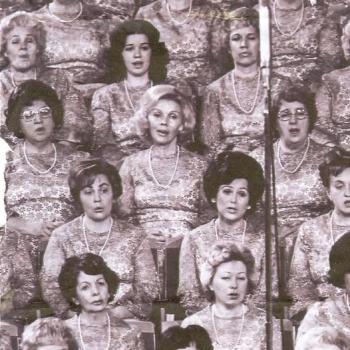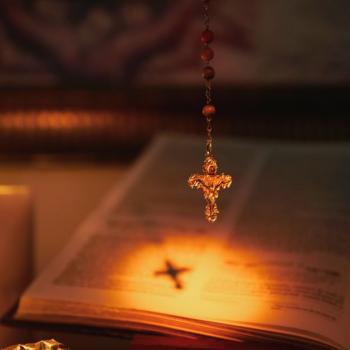Now Featured in the Patheos Book Club
The Awakening of Hope
Why We Practice a Common Faith
By Jonathan Wilson-Hartgrove
Book Excerpt
In a sparse living room, just off a busy street, a young man kneels on hard wood floor, his head bowed, oil dripping from his hair. Standing around him with their hands on his head, his back, his shoulders, a small group is praying. They are asking God to bless the promise this young man has made—"to persevere with these people in this place." Minutes ago, one of them read from Psalm 133: "How good and pleasant it is when God's people live together in unity! It is like precious oil poured on the head, running down on the beard, running down on Aaron's beard, down on the collar of his robe."
This oil is anointing oil, like the oil that marked Aaron as a priest—like the perfume that Mary of Bethany poured on Jesus' feet, signifying him as one who was set apart for God's service. This is precious oil, dripping down on holy ground. It is precious not so much for its market value as for the commitment it marks.
"Do you promise to submit to the Holy Spirit as discerned in this community?" a leader asked the young man as he presented himself for membership. His "I do" was echoed by the community, who pledged their commitment to him. Now they are touching, united in prayer, the oil of these promises on each of their hands. This is a solemn vow before their God.
If a passerby in this low-income, inner-city neighborhood were to peek in the window and witness this scene, she would probably be suspicious. Who besides gangs and cults perform ritual acts of initiation, asking members to commit their whole life to something? If she knew this young man, she would likely be concerned. Has he been brainwashed by this group? We are leery of organizations that ask too much of people. We worry about friends who submit to extreme demands. Vows can be dangerous.
Yet, for most of the history of the church, small groups of monks and nuns have welcomed members in ceremonies like this, making lifelong promises in the service of God and the church. In his Rule, St. Benedict of Nursia instructs communities to test those who come seeking membership, leaving them to knock at the door for four or five days. Only if these seekers are persistent should they be invited into the community for a short time, after which the Rule is to be thoroughly explained to them. Then, if they want, they can practice living this way of life. Through various stages, this testing continues. When someone is finally ready to join, the commitment is total: she declares her intent to the group, bows at their feet in prayer, and leaves everything, even the clothes on her back, for the new life she has chosen in community.
Extreme as this may seem to the modern observer, monastic vows sound somewhat familiar to anyone who has been to a wedding ceremony or themselves said "I do" before God and community. In both its commitments of marriage and celibacy, the church calls its members to make promises about who we will be faithful to in our daily living. Our lives are not our own. We have been made living members of the body of Christ. Our new life gets fleshed out in terms of particular relationships and the promises that make them possible. To learn to live "in Christ" is to learn to make promises and keep them.
But we live in a world marked by infidelity, each of us debilitated in our incapacity to do what we say we will do. While we may suspect others of simply lying when they do not keep their promises, we each know from our own experience that we often fail to do things that we fully intended to do when we said we would do them. Indeed, we may have never consciously chosen notto do them. We just forgot. Or got distracted by other things. Yet these broken promises add up, creating walls of mistrust on the already fragmented landscape of our shared existence. We learn to confess both the evil we've done and "the things we have left undone" because we know our will is weak from the start.
Infidelity is a tendency deep within us. But it is also encouraged by the constant barrage of powers at work in this world's broken systems. Because sex sells we are inundated daily by the suggestive poses of women and men to whom we're not only not committed but whom we do not even know. Their images come to our senses not as icons in which we might glimpse the divine but as products to be consumed. This pornographic imagination is extended to real estate, destinations, entertainment events, and even educational opportunities. Our broken economy does not invite us to ask how we might be faithful to our people and place but rather how we might use them to satisfy our base desires. Infidelity is sold to us as a good.
St. Augustine of Hippo made an important distinction between something that is to be enjoyed for its own sake and something that is to be used for the sake of enjoying something else. Unlike the modern philosopher Immanuel Kant, who argued that human beings are ends in themselves, Augustine claimed that all creatures—even fellow humans—are to be "used" for the sake of enjoying God. Everything God has made is good, and people are verygood, according to the creation story. But every good thing is meant to point us toward the greatest Good, the Giver of all good things.




